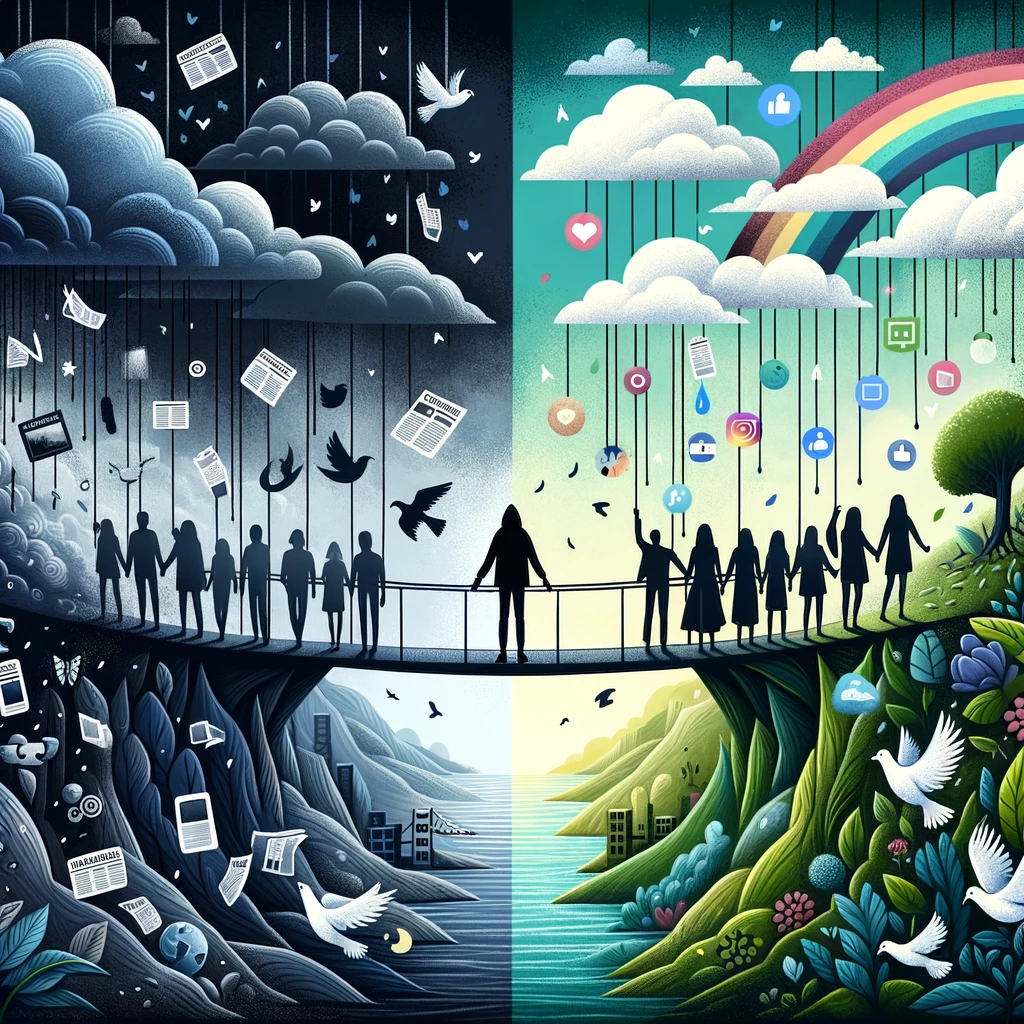In recent times, there has been an increasing sentiment of “hate for humanity” in some sections of society. If you’ve ever found yourself muttering about the state of the world and felt disillusioned with the human race, this article is for you. Let’s delve deep into understanding where this sentiment comes from and what it truly means.
Where Does This Hate For Humanity Stem From?
Often, the underlying reasons for the growing hate for humanity lie in the inundation of negative news we consume. With a 24/7 news cycle focusing largely on tragedies, crimes, and injustices, it’s easy to develop a skewed perspective. It’s crucial to remember that while bad things undoubtedly happen, there’s a vast amount of goodness that goes unreported.
The Role of Social Media
The explosion of social media has exacerbated feelings of animosity. The very platforms designed to connect us have ironically sown division. Every day, countless opinions and worldviews clash online, often leading to feelings of “hate for humanity” when we encounter views that sharply contrast our own.
Understanding the Larger Picture
Despite the challenges, humans have achieved tremendous progress. Advancements in technology, medicine, and social justice have reshaped our world for the better. Focusing solely on the negatives ignores the larger, often positive, trajectory of human history.
Counteracting The Negativity
Engage in perspective-taking exercises. Whenever you feel overwhelmed with “hate for humanity”, remember to step back and view situations from multiple angles. It’s essential to practice empathy and strive to understand different viewpoints.
The Power of Human Connection
While it’s easy to succumb to negative sentiments, forging genuine connections can dramatically alter your outlook. Engaging in meaningful conversations, participating in community service, or simply lending a listening ear can reinforce the inherent goodness in people.
Take Regular Breaks
To maintain mental well-being and curb feelings of “hate for humanity”, it’s crucial to disconnect occasionally. Whether it’s a break from news or social media, unplugging can offer clarity and a renewed perspective.
Focusing On Personal Growth
Instead of harboring resentment, channel that energy towards personal growth. Embrace activities that uplift your spirits and expand your horizons. Whether it’s picking up a new hobby, traveling, or learning a new skill, it’s a productive way to navigate feelings of disillusionment.
Remember, every individual’s experience is unique. Just because one person expresses a deep “hate for humanity” doesn’t mean they’ve turned their back on all human beings. It could be a fleeting sentiment, born from a particular incident or period of their life.

FAQ’s – Frequently Asked Questions
1. What causes feelings of hate for humanity?
Feelings of animosity towards humanity often stem from a continuous exposure to negative news, divisive content on social media, and personal experiences that might have influenced one’s perception.
2. How does social media influence our perspective of humanity?
Social media, despite its intent to connect, often amplifies divisive voices and conflicts. Encountering contrasting views without context can lead to increased feelings of disillusionment and negativity.
3. Are there ways to counteract feelings of hate towards humanity?
Absolutely! Engaging in genuine human connections, taking regular breaks from overwhelming content, and focusing on personal growth and positive engagements can significantly help in renewing one’s faith in humanity.
4. How does understanding the larger picture of human history help?
Recognizing the numerous positive achievements, advancements, and progress in human history can offer a balanced perspective, ensuring we don’t solely focus on the negatives.
5. Is it natural to sometimes feel disillusioned with humanity?
Everyone, at some point, might feel disillusioned due to personal experiences or global events. What’s essential is how we navigate these feelings and seek a broader, more holistic understanding of humanity.
6. How can personal growth help in combating negative sentiments?
Channeling one’s energy towards activities that uplift the spirit, whether it’s learning, traveling, or indulging in hobbies, can provide a constructive outlet and shift focus from negative sentiments.
7. Why do I hate everyone?
Feelings of animosity towards everyone can stem from various reasons, ranging from personal experiences and traumas to prolonged exposure to negative stimuli. It might also be a manifestation of stress, anxiety, or other underlying mental health conditions. It’s essential to reflect on the source and seek professional guidance if these feelings persist.
8. What is a Misanthrope?
A misanthrope is someone who has a general distrust or dislike of humankind. Their feelings can be rooted in personal experiences, philosophical beliefs, or other influences that have shaped their perspective.
9. Why do people hate?
Hate often arises from fear, misunderstandings, or negative past experiences. It can also be a defense mechanism, protecting individuals from perceived threats or vulnerabilities. Societal factors, upbringing, and personal experiences all contribute to feelings of hate.
10. What does Misanthropic mean?
Misanthropic describes a viewpoint or attitude that displays distrust or aversion towards humans or human society at large. It represents a general dislike or skepticism about human nature.
11. What does Misanthropist mean?
A misanthropist is someone who harbors a general aversion to or distrust of humanity. The term aligns closely with ‘misanthrope,’ and both denote a dislike for people or skepticism about human nature.
12. What is the opposite of hate?
The opposite of hate is love. While hate embodies strong feelings of aversion and animosity, love signifies affection, warmth, and deep care.
13. Why do I hate everything?
Intense negative feelings towards everything could be an indicator of underlying mental health issues such as depression, anxiety, or other mood disorders. It might also be a reaction to accumulated stressors or unresolved traumas. Professional counseling can be beneficial in understanding and addressing these feelings.
14. Why don’t I like people?
Not liking people can result from a combination of personal experiences, temperament, or social anxieties. Everyone has a unique comfort level with social interactions, and past negative experiences can influence one’s feelings towards social situations.
15. Why do I dislike almost everyone?
Such a broad feeling of aversion might indicate a defense mechanism against potential emotional harm or vulnerability. It could also be influenced by past traumas, upbringing, or an accumulation of negative experiences with individuals over time.
16. Are humans viruses?
Humans aren’t viruses. The term “virus” is sometimes metaphorically used in cultural critiques to highlight negative human impacts on the planet. However, biologically, humans are mammals, and viruses are infectious agents that need a host to reproduce.
17. Is misanthropy a disorder?
Misanthropy, in itself, isn’t classified as a mental disorder. However, extreme aversion to human interaction can be symptomatic of other underlying psychological issues. If such feelings interfere with daily functioning or cause distress, it’s wise to seek professional help.
18. What is it called when you don’t like anyone?
Disliking everyone is often termed as ‘misanthropy.’ A person who feels this way is known as a ‘misanthrope.’
19. Why do I hate my friends?
Negative feelings towards friends could be a result of unresolved conflicts, feelings of betrayal, or growing apart over time. It’s also possible that underlying personal issues or mental health conditions might be projecting onto relationships. Open communication and introspection can help understand and navigate such feelings.
20. How to deal with hate?
Dealing with hate requires introspection and active countermeasures. Start by identifying the source of your feelings to address underlying issues. Engage in open dialogues to bridge understanding gaps and employ empathy to see from others’ perspectives. It’s also beneficial to surround yourself with positive influences, seek counseling or therapy if the feelings are overpowering, and practice mindfulness techniques like meditation to maintain emotional balance.
20. Is Misanthropy a sign of depression?
While misanthropy, or a general dislike for humanity, isn’t inherently a symptom of depression, the two can be interconnected. Someone who is depressed might develop negative views of the world and the people around them. If feelings of misanthropy are accompanied by persistent sadness, loss of interest, fatigue, and other signs of depression, it’s essential to seek professional guidance.
21. What causes hate?
Hate can be a complex emotion stemming from various sources. It can arise from personal traumas, perceived threats, misunderstandings, cultural or societal teachings, jealousy, or feelings of betrayal. Prejudices and biases, often ingrained during upbringing or reinforced by society, can also lead to feelings of hate towards particular groups or individuals.
22. How to be nice to someone you hate?
Being nice to someone you dislike requires self-control and a conscious decision to act civilly. Start by separating the person from their actions; this can help you respond to the situation rather than the individual. Engage in active listening, avoid gossip, maintain professional boundaries, and practice empathy. Remember, being polite doesn’t mean you have to be close friends; it’s about fostering a respectful environment, even if underlying differences remain.
Feelings of “hate for humanity” are often a product of our environment and the content we consume. By actively seeking out positivity, forging genuine human connections, and focusing on personal growth, we can combat these feelings and appreciate the beauty of human existence. After all, humanity, with all its flaws, also holds immeasurable potential for love, innovation, and progress.
Also read: 12 Famous Misanthropist Around The World




